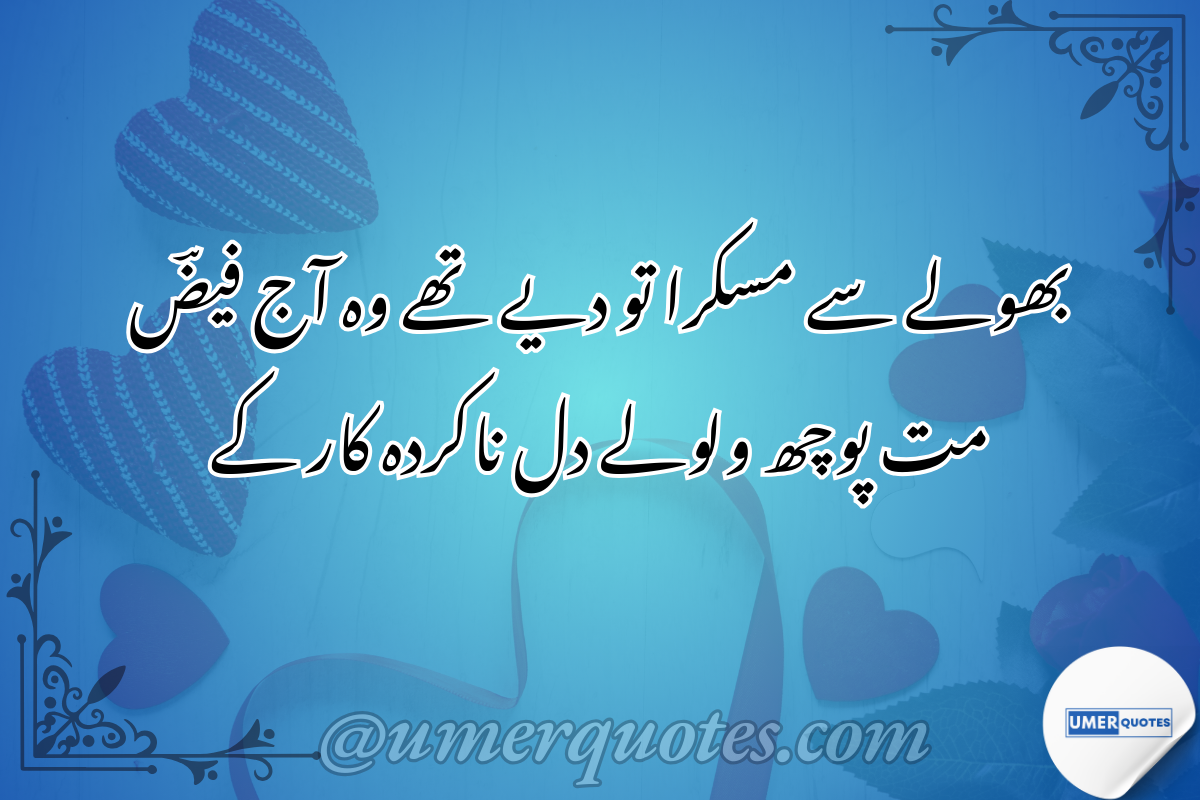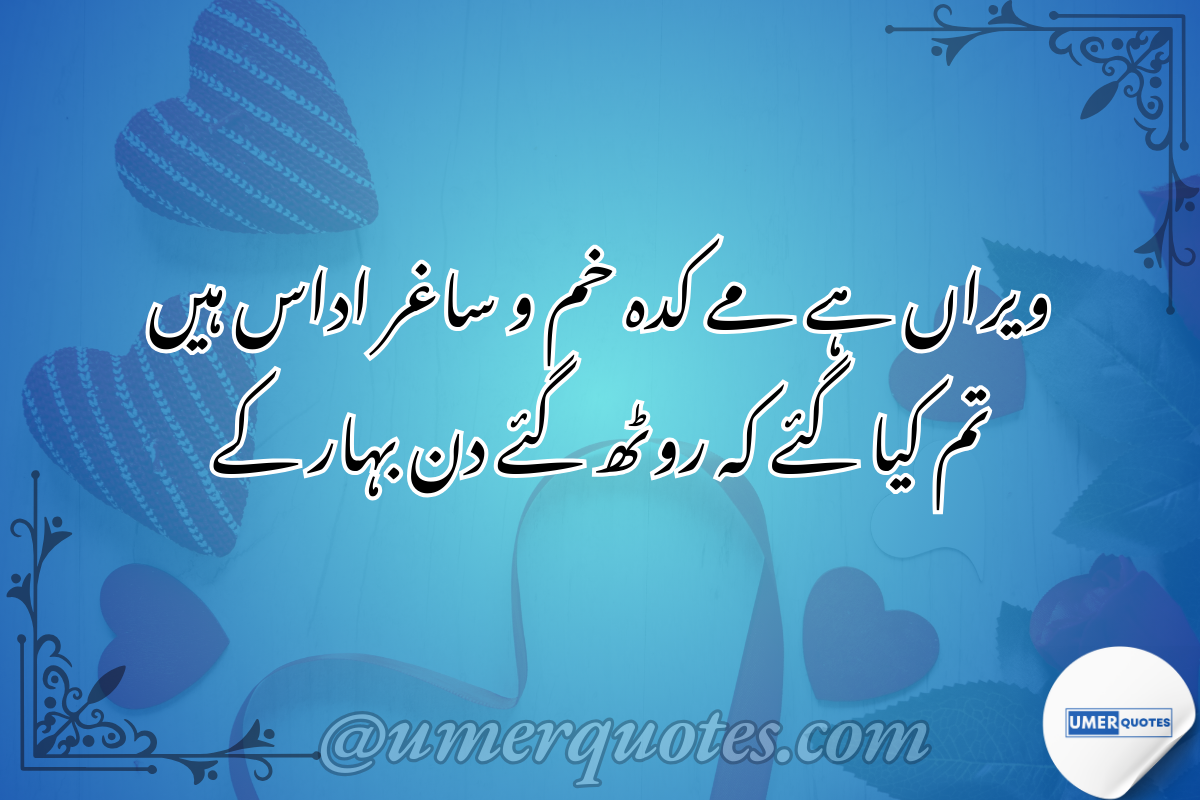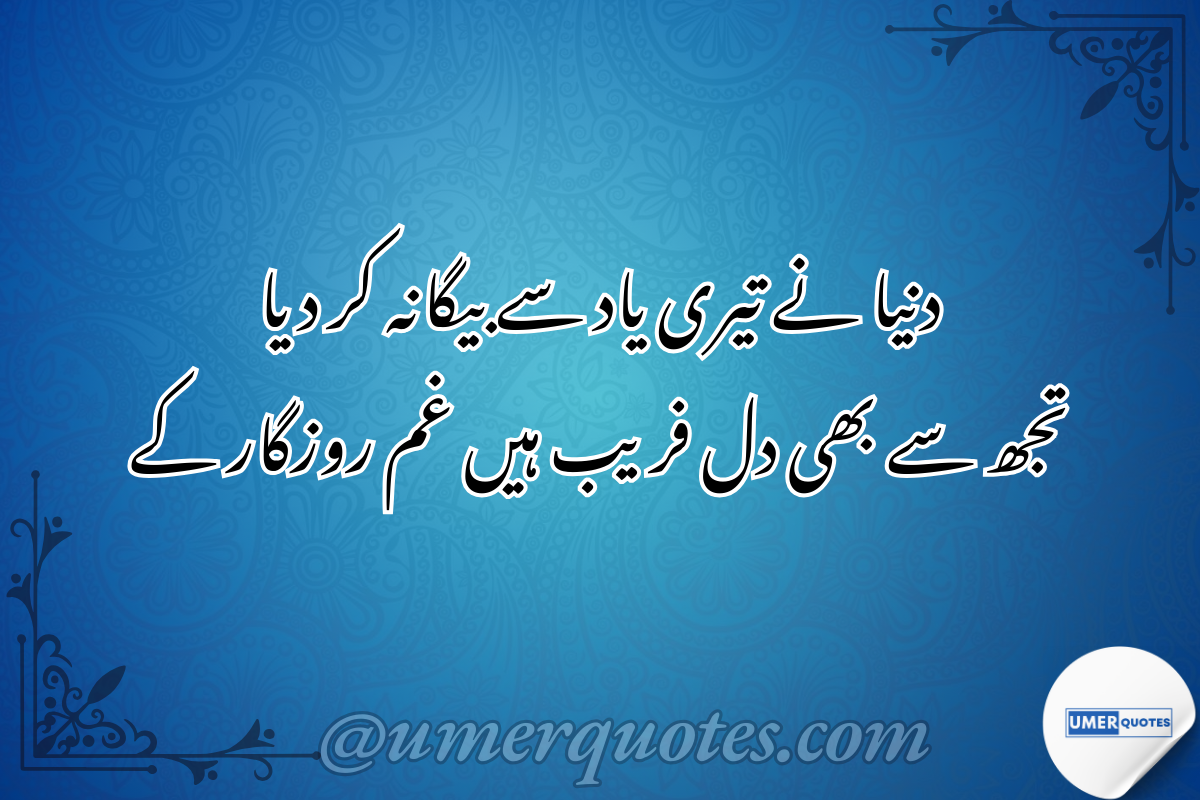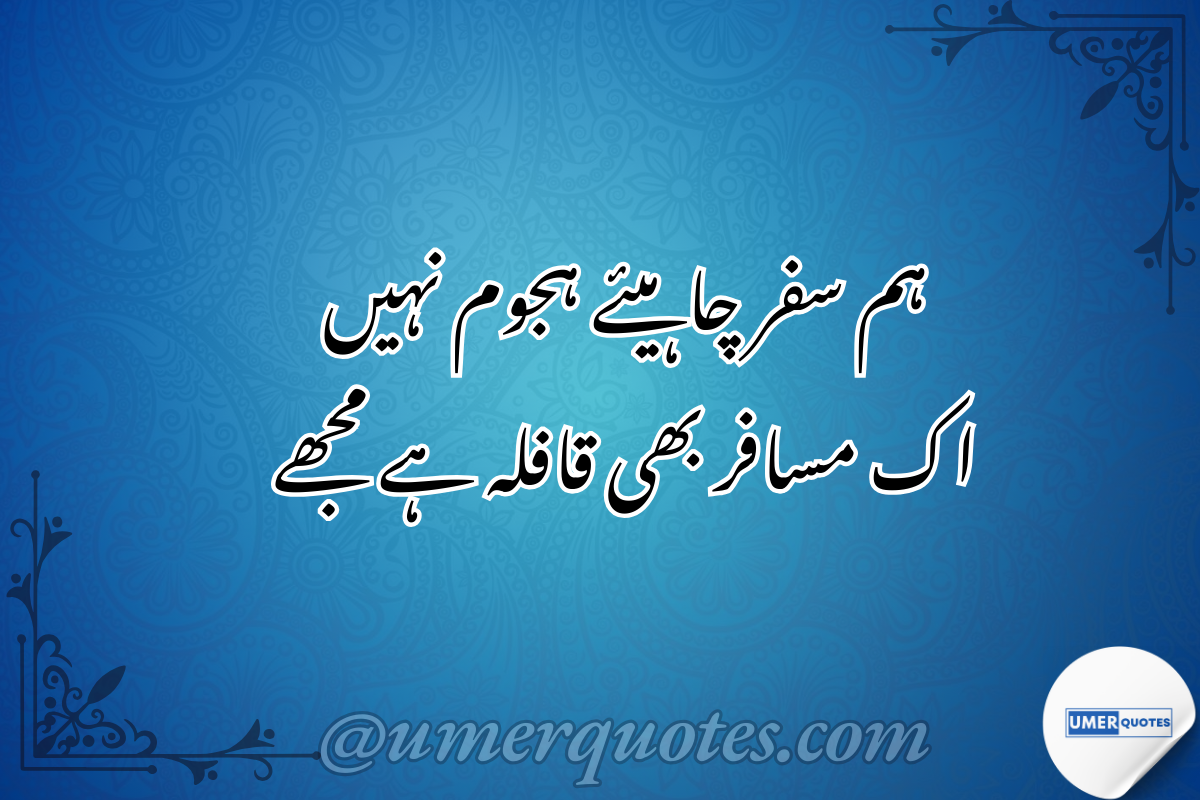
بھولے سے مسکرا تو دیے تھے وہ آج فیضؔ
مت پوچھ ولولے دل ناکردہ کار کے
He had smiled out of forgetfulness:
This stanza describes a happy and sudden moment when the beloved or loved one, possibly in an involuntary act, offered a smile. “Forgetfully” means that the smile may have come unintentionally, or it was a spontaneous moment in which the person smiled without any particular purpose. “Woh Aaj Faiz” means that this smile happened at a particular moment or occasion, and the poet feels the impact of that time.This smile brings a sense of happiness and peace to the heart of a person, and it shows a deep love or affection.
Do not ask the heartless:
This stanza describes the intensity and emotional state of the heart. “Vulture” means enthusiasm, enthusiasm, or passion. “The heart of the idler” means that the human heart, which is apparently in a state of inactivity, still harbors countless emotions and desires within. The poet is telling here that if the beloved or Aziz gave a spontaneous smile, its effect was deep on his heart, and his enthusiasm increased. The heart that has no special function But this smile evokes many emotions and desires in him.
Message:
These poems show that even a small smile or look of someone can make a deep impression on the heart. The poet is telling here that sometimes a small gesture of a human being, like a smile, can create so many emotions and desires in another’s heart that it seems to be beyond his control. These poems describe the power of love and its emotional effects, which can change the state of the heart in an instant.

ویراں ہے مے کدہ خم و ساغر اداس ہیں
تم کیا گئے کہ روٹھ گئے دن بہار کے
Varan Hai May Kadah Khum and Saghar are sad:
This stanza describes a sad and empty state. “Veeran Hai May Kada” means that the pub (which is usually a place of joy, party or fun) is now desolate and desolate, i.e. its charm and fragrance are gone. “Khum and sagar are sad” means that the jam (kham) and the bowl (sagar), which were once the occasion of joy and revelry.Used to be representatives, now depressed and silent. The poet here depicts a state where the joy and gaiety of life has vanished, and everything is plunged into a sadness or emptiness.
Did you cry on the day of spring?
This stanza describes the separation of a loved one and the depressed state that follows. “You’re gone” means that after the beloved or loved one is gone, all joy and light is gone. “Roth gaye din bihar ke” means that the days of joy (like the spring season) turned to sorrow with the departure of the beloved. Spring is usually happy,It is supposed to be a symbol of freshness and beauty, but in this stanza the poet describes that after the separation of the beloved, he has wept even on the day of happiness, meaning that there is no more happiness in life.
Message:
These poems depict separation, grief and the loss of past happiness. The poet describes that after the separation of the beloved or dear one, the happiness and color in life has ended. There is a deep sadness and sorrow in these poems, where the splendor and happiness of the world has disappeared. The poet has described this situation in such a way that with the departure of the beloved, the joys and hopes of life also ended.

دنیا نے تیری یاد سے بیگانہ کر دیا
تجھ سے بھی دل فریب ہیں غم روزگار کے
The world has alienated you from your memory:
This stanza describes an emotional and sad state. “The world has alienated you from your memory” means that the problems of the world and its troubles have made the poet so sad and troubled that he has become alienated from the memory of the Beloved. It can also mean that the difficulties of life and the realities of the world are too much for the soul of the poet It is deeply affecting that he is removing the memory of his beloved from his heart. The harsh realities of the world and its sufferings often make people forget their loves and memories.
You are also deceived by grief and sorrow:
This verse in a way describes the sufferings and difficulties of the world. “Teh bhi dil farib hai gham rozgar ke” means that the memory or love of the beloved, which once gave peace and joy to the heart, is no longer so heart-deluding. The poet is telling here that the problems of the world, such as the problems of employment, have become so intense that he feels even the memory of the beloved as a mere illusion. Sadness plagued the realities of his life and has obscured the affections in such a way that he no longer finds comfort or comfort in them.
Message:
These poems describe the effects of the sorrows and troubles of the world, which also affect a person’s love and memories. The poet shows that when the difficulties in a man’s life increase, he is turned away from his loves and desires, and the sufferings of the world overwhelm him so much that he loses his former joys.Even the memories seem like an illusion. These poems describe the fact that the mortal difficulties of the world often make the heart and mind of man devoid of his love.

ہم سفر چاہیئے ہجوم نہیں
اک مسافر بھی قافلہ ہے مجھے
We want to travel, not the crowd:
This stanza represents man’s search for self and inner peace. “Hum safar khawan” means that the poet needs a life partner or a fellow traveler who is understanding, shares his grief and is true, not someone who is just like the crowd, who is just there but not from the heart. . “Not a crowd” means that one does not want people who are just outnumbered, but with whom there is no intimate relationship. This stanza It states that the poet wants only true relationship, which understands the depths of his soul, and not unnecessary or superficial relationships.
I am also a passenger:
This verse affirms the freedom of man and his own destiny. “A wayfarer” means that the poet thinks of himself as a wayfarer, who is on his way. “Kafala hai me” means that even though he is an individual, his own quest, struggle and autonomy are so important that he does not become a part of any crowd or collective pressure to make himself a kafala (i.e. a goal or a destination). group moving towards) understand. This verse is about this shows that the individual himself can be a complete caravan in his struggle, as he moves towards his goal and path.
Message:
These poems describe the depths of the human soul, the desire to walk alone and the importance of true relationships. The poet expresses that he only needs a true companion in life, who understands his inner world and is capable of moving with it, not individuals who are just part of the crowd. The poet sees himself as a traveler, following his own path and his caravan is bound up with his own struggle and purpose.






